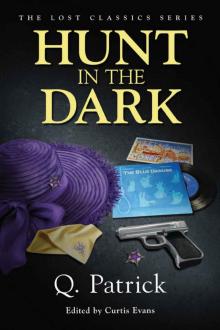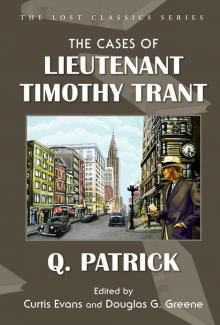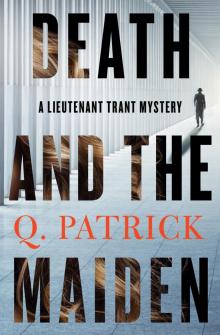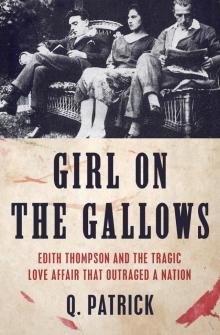- Home
- Q. Patrick
The Cases of Lieutenant Timothy Trant (Lost Classics) Page 4
The Cases of Lieutenant Timothy Trant (Lost Classics) Read online
Page 4
* * *
Vaguely Leslie had realized that the lieutenant was leading up to this. But it still did not make sense. It had been hard enough to realize that someone she knew had been murdered; it was infinitely harder to realize that one of her friends could be a murderer.
Trant was talking quietly as if nothing had been changed.
Suddenly he rose and moved to the door. “I’m ready to see the others now.”
Robert guided Leslie after him, a large, comforting hand on her elbow.
As they passed down the stairs, a confused argument sounded from the hall. Leslie recognized Faith Felton’s husky, dramatic voice.
“Darling Jimmy, you know you can be clever if you try... make the man understand we’ve got to get out of this place.”
Faith was swirling around an unimpressionable policeman, gesticulating with slender gloved hands, shedding an expensive wake of cyclamen perfume, while her husband still watched sardonically.
They both turned when they saw Trant. The actress swept toward him. “That’s the one in charge! Make him let me go, Jimmy.”
Jim Harding’s dark, ironical gaze fixed the lieutenant. “My wife’s getting a little restive. She has to play tonight. Won’t you hand her an exit line? As her husband, I can give any information you may want...”
“But only Miss Felton can play Sally McCreedy in The Story of Mark,” broke in Trant dryly. “I agree with you. I had the pleasure of seeing her last week. A real artist.”
“So divine of you!” Faith smiled the dazzling Sally McCreedy smile which had thrilled Broadway audiences nights and matinees for the past eighteen months. “Isn’t he a divine policeman, Jimmy? Then it’s all right? I can leave?” Trant’s eyes were very steady. “As I remember, you don’t appear until about halfway through the first act. I hope to
be finished with you all in plenty of time, Miss Felton.”
He moved the few steps into the living room where Gordy Keath. Dave Walker and Yvonne Prévost were grouped awkwardly. The others followed him. Faith looked nonplussed and, Leslie thought, a little frightened too as she gripped Trant’s arm.
“But I have to eat. I have to make up. I have to do a million things. Just because Minna killed herself, you can’t keep me here. It’s no concern of mine.”
“If Miss Lucas had killed herself, I agree it would have been no concern of yours.” Lieutenant Trant’s travelling gaze moved from one intent face to another. “But I’m afraid this thing must be of some concern to you all now, because it so happens that Miss Lucas was—murdered.” In the terrifying silence which followed that remark, he moved to the table and indicated a tray of glasses.
“Seven guests—eight glasses. You might have guessed for yourselves that Miss Lucas was intending to be at the party.”
Flash impressions of faces came to Leslie—Gordy’s jaw dropping, Jim Harding’s pupils narrowing to needle points. Faith’s hand frozen halfway to the throat of her silver fox cape. Dimly she was conscious too of Dave Walker’s hand gripping Yvonne’s in a gesture which seemed half protective, half warning.
But none of them spoke. It was as if none of them could shatter that impregnable wall of speechlessness. In a quiet, unemphatic voice, Lieutenant Trant explained the facts which had led to his conclusion of murder. He asked if any of them had seen Minna alive that afternoon, either before or after the party had started. No one replied. He asked if any of them had heard a shot.
Yvonne Prévost spoke then. In a voice that had exaggerated harshness, she said:
“We wouldn’t have heard a bomb explode—what with the windows open, the rush-hour traffic outside and the radio blaring.”
Flatly each of them admitted that he or she had arrived at the party separately and had gone up to one of the bedrooms to remove coat and hat.
Jimmy Harding said, with an attempt at lightness. “You’re surely not suggesting one of us could have removed a hat, a coat and Minna in the few minutes we were upstairs alone!”
“It didn’t take long to hit someone over the head and shoot them, Mr. Harding—if everything has been planned out ahead of time.” Lieutenant Trant’s unyielding gaze once again moved around the taut circle of faces. “Even so,
I would like to know which of you arrived here first.” Leslie, perched on the arm of the couch, turned instinctively to Gordy Keath, watching him with a queer, pinched feeling of apprehension.
He grinned weakly. “I got here quite a while before the rest of the bunch. It was Minna’s idea. She dropped a note in my mailbox this afternoon, asking me to get the party started.”
“You have the note?”
“Sure.” Gordy’s casualness was painfully on the surface as he produced a piece of paper from his pocket and handed it to the detective. “I live only a couple of blocks from here. I found the note in the mailbox when I got back from work about five-twenty. Minna’s door key was enclosed. Being a good-natured agent, I came right over without even washing up.”
Lieutenant Trant regarded the note gravely. It was typewritten and read:
Gordy—
I have a very important business date this afternoon. Can’t interrupt it or cut it short. So may be a bit late for the party. Since the maid’s out, I’m going to be stuck unless you’ll be an angel and get things started. Everything’s put out. All you have to do is to be your usual exuberant self. I’m keeping the windows open, by the way, because the room seemed kind of stuffy. Thanks frightfully. M. L.
P.S. You might turn the radio on. The party’s going to be sticky at first and there’s nothing like music to smooth things over. I’m enclosing the front door key.
Rather hesitantly Gordy explained how he had arrived at the house at about five-twenty, found everything ready and had gone into the kitchen. Soon the buzzer had rung and the first guest, Yvonne Prévost, had arrived. He told her where to put her things and asked her to let the other guests in. Trant listened in complete silence. At length he said:
“I presume you gathered from this note, Mr. Keath, that Miss Lucas had gone out for this important business conference?”
“Sure.”
“Whereas, in fact, she must have been in this house, up in the studio, all the time—waiting for the important business date to come to her. Since Miss Lucas could not, on the medical evidence, have been dead before Mr. Keath arrived at five-twenty, it’s hard to see how that business date could have been anyone except one of you.” In the sudden sharpening of tension, he looked up. “I’d like to know exactly why each of you was invited here this evening—and why you came.”
“There’s no mystery why Jimmy and I came.” Faith Felton fluttered a perfumed handkerchief and once again gave Lieutenant Trant a rather wilted sample of the Sally McCreedy smile. “I was a very old friend of poor Minna’s. In fact, we were brought up together by her aunt, a dear sweet person. And when I came to New York, I roomed with her and Leslie—Miss Cole. Of course, poor Minna was a queer kind of girl. It was awfully hard to warm to her.” She gestured at Leslie.
“Wasn’t it, darling? But I’ve always felt terribly grateful, because it was really through her being Mr. Boyer’s secretary that I met Jimmy and—and got the Sally McCreedy role that gave me my break on Broadway.”
Leslie watched her, wondering if Faith’s theatrical imitation of composure were as transparent to Lieutenant Trant as it was to her.
“Recently Jimmy and I had a tiny difference of opinion with Minna. She was very eager for Jimmy to adapt her novel as a vehicle for me. She thought, poor darling, that just because Jimmy had made a hit dramatizing Robert’s book, that he could do the same for her. We’d love to have been able to help her, of course, but it was quite impossible. A terrible novel—no stage possibilities. No role for me—just one female character, a bitter, dreary, unappetizing spinster. Jimmy had to refuse.” She shrugged. “There was quite a little scene.”
She paused. looked around vaguely. “I hate quarrels. Yesterday Minna called up and invited us to this party. I took it a
s a gesture of reconciliation, so of course I accepted. Poor Minna, she’d had so many bad breaks. It was a shame to be mean to her.”
Trant had been watching the dramatic ebb and flow of her expressions in steady silence. Now he said: “So you and your husband came to the party out of sympathy?”
“Yes. That’s it. Out of sympathy.”
“I see no reason not to be frank.” Jim Harding’s dark, caustic gaze moved over Faith’s beautiful face. “Maybe my wife came here for palliness; I came for policy. That girl was mad keen for me to adapt her novel. Although I’d refused, she kept on nagging. She could be pretty dangerous when she got mad. She ended up by hinting that if I didn’t do something about the book, she’d go all out to see I didn’t get a crack at the dramatization of Boyer’s next novel.”
Robert, who had been standing patiently by the window, stared at the playwright in surprise. “But that’s nonsense, Jimmy. You know I wouldn’t ask anyone else to dramatize it. How on earth could Minna have interfered?”
“Hadn’t any idea.” Jim Harding looked rather uneasy. “But I’d learned from experience that she was perfectly capable of—of digging up some imaginary dirt from my past if she’d wanted to be vindictive. I wasn’t taking any chances.”
“I wasn’t either,” said Gordy. “That was why I came. Minna wasn’t a profitable client for me at the present time. But she had taken her manuscript away from me, and it’s against my policy as an agent to alienate any author.”
“Thank you.” Lieutenant Trant’s unqualified acceptance of all their stories was rather terrifying. After a moment’s pause, he added: “Certain facts seem to be established now. When Mr. Keath arrived here, Miss Lucas was almost certainly upstairs in the studio waiting for someone to keep a business appointment. Almost certainly, too, that person did keep the appointment—and murdered her.”
Leslie stiffened as she saw him glance down at his left thumbnail. “According to what you have said, any one of you three might possibly have had business to discuss with Miss Lucas—Miss Felton and Mr. Harding about the adaptation of the novel, Mr. Keath about the novel itself.” His gaze moved to Dave Walker who stood, square and uncompromising, by his fiancée. “Now you. Mr. Walker. I’d be interested to know why you came to a party given by Miss Lucas.”
There had been a faintly challenging note in his voice which must have made it obvious even to Dave Walker himself that the detective knew the circumstances which had surrounded the breaking off of his engagement with Minna. Leslie watched the young man as a flush spread over his handsome, rather ruthless face.
“Nothing simpler to explain,” he grunted. “I happened to have to telephone Miss Lucas yesterday. She told me she was giving a party to celebrate something about her book. She asked me to bring Miss Prévost along.”
“She wanted to be introduced to your new fiancée?”
Dave Walker’s dark blue eyes narrowed. “Heavens no, she’d known Yvonne quite a while.”
“She had? Then isn’t it rather odd that she invited you both? Maybe she wanted Miss Prévost to design the jacket for her novel.”
“Why should it be odd for her to invite us?” It was Yvonne Prévost who broke in, her thin, arresting face white with exasperation. “This isn’t the Victorian Age. People don’t avoid each other just because they used to be engaged.”
“Don’t they?” asked Trant naively.
“You’re just trying to be clever, trying to trick us.” The girl swung round to Dave. “There was every reason in the world why Dave and I should have come here today. We— we had to see Minna, both of us. We had to discuss a very important business...”
Her voice stopped suddenly. And yet to Leslie it seemed as if Yvonne herself had been the last person to realize the implications of what she had said. Dave Walker’s lips had tightened into a thin hard line. The others were staring in keyed-up fascination.
Lieutenant Trant smiled a faint smile. And Leslie knew then that somehow, in some obscurely planned way of his own. He had been working around to make the girl say— just that.
“Thank you, Miss Prévost. That’s all I wanted to know.
So you and Mr. Walker did come here on business too.”
In the electric silence that followed, Leslie waited for the lieutenant to say formally what could surely be kept back no longer—that suspicion for the murder of Minna Lucas was entirely restricted to the seven of them in that room.
But once again Lieutenant Trant fooled her. Abruptly, it seemed, the interview had ceased to interest him. With a slight, almost casual gesture, he said:
“Thank you, ladies and gentlemen, I think that’s all for the moment. When you pick up your hats and coats upstairs, I’d be grateful if you’d give the sergeant your fingerprints and the various addresses where I’ll be able to reach you if I need you again—tonight...”
No objections were raised to the routine process of fingerprinting. Within a few minutes, Minna Lucas’ guests were going their several ways. Dave Walker and Yvonne Prévost drove off together. Faith and Jim Harding carried Robert away with them to the Vandolan Theatre where The Story of Mark was playing.
Leslie and Gordy Keath were the last to move out into the bleak February darkness.
Gordy squeezed her arm affectionately. “Well, beautiful, murder notwithstanding, I still seem to be stuck with you. I guess I’ll have to feed you.”
Leslie felt cold and exhausted and, to her faintly shocked surprise, very hungry. “Somewhere expensive, Gordy,” she said. “With glamour. I’m going to set you back three-fifty tonight.”
Through months of good-natured hostility, the din ner controversy had become a ritual to Leslie and Gordy. Invariably Leslie tried to chisel a dinner at some smart 52nd Street club, while almost invariably Gordy beat her down to a seventy-five-cent blue-plate special. That night, however, to Leslie’s distinct astonishment, he gave in without a struggle.
“Three-fifty. Four-fifty. Five-fifty. Anything, darling— just to help you forget. A cab? No, let’s walk awhile. Do you good.”
“Yes,” she agreed. “Let’s. I feel stifled.”
At last some of that feeling of the world gone suddenly mad left Leslie. Gordy helped a lot. Just to have his comfortable male presence close to her restored a certain amount of proportion. And yet that horrible thing was still overpoweringly in her mind, looming like a black shadow.
Suddenly she asked, “Gordy, do you really believe it?”
“That Minna was murdered? Yes. She was rather that sort of a gal, wasn’t she?”
“But what I mean is—do you really think one of us did it?”
Gordy’s face went grim. “I’d think anything that policeman thinks. He’s supposed to be the smartest boy on the force. Having seen him in action, that seems kind of an understatement.”
“But who, Gordy?” Leslie’s blue, solemn eyes peered at him wonderingly.
“Not me.” He grinned and squeezed her hand. “If it makes you feel any chummier, I had no desire to kill her.”
“But I don’t see how anyone... I mean, it’s incredible to think of anyone you’re fond of being capable of murder.”
“I’m fond of someone who’s capable of murder, someone who was at the party tonight.”
Leslie watched intensely. “Who’s—who’s that, Gordy?”
“You, darling. It’s just the ponderous, conscientious sort of thing you’d do—to murder a bad novelist for the cause of Great Literature.”
“Gordy!” Leslie’s small face was horrified. “You don’t really think that!”
“Of course I do.” Gordy looked at her with extreme gravity. “Think how swell it would be to have you as an undetected murderess. I could blackmail you into buying all my unsaleable manuscripts.”
His mood helped her. Soon Leslie’s mind was pleasantly preoccupied balancing Lobster Newburg against Chateaubriand Steak. But, as Gordy hailed a taxi, a man hurried up to them.
“Miss Cole, Lieutenant Trant wants to see you straightaway.”
Leslie stared. “But I haven’t had dinner yet,” she said bleakly, the visions of Lobster Newburg fading.
“There’s a drugstore right across the street,” said the policeman helpfully. “There would be time for a sandwich.” Leslie turned to Gordy. He was grinning sheepishly, and a sudden suspicion dawned.
“A five-fifty dinner indeed!” she said. “You knew this would happen all along. You knew we’d end up at a drugstore. You deliberately held us up with that walking idea.”
“Lieutenant Trant did mention he might need you,” he admitted.
Ignoring the plain-clothes man, he bent and kissed her on the left ear. But Leslie had become a five-foot pillar of quivering indignation.
“Rat,” she said.
* * *
Twenty minutes later she was hurrying back to Minna’s house with the policeman. She felt unreasonably nervous, and her nervousness increased as she was conducted upstairs to the studio where Lieutenant Trant was waiting for her.
The body had been removed, but everything else seemed untouched. The manuscript of Minna’s novel still lay scattered, as it had been, across the carpet. Leslie kept herself from looking at those stained pages.
Lieutenant Trant dismissed the plainclothes man and smiled at her. His grey eyes were as deceptively, as ominously, good-tempered as ever.
“It’s nice of you to come, Miss Cole.”
“On the contrary, I was dragged here by the ear.” Leslie registered hostility. “What do you want?”
“When a policeman gets entangled in feminine psychology, it takes a woman to unravel him.” He studied her face, a faint hint of admiration in his eyes. “An intelligent woman.”
Leslie was pretty enough to like being called intelligent. In spite of herself she felt somewhat mollified. “Just how can I help?”
“By getting me a little straight on Miss Lucas. The more I find out about her, the more complicated a young woman she seems to have been. In the first place, I’m rather puzzled by her taste in ink.” Lieutenant Trant’s expression had a certain mock gravity which, Leslie felt, was part of his stock in trade for tête-à-têtes with Women in the Case. “From the manuscript of her novel it seems that she despised the humdrum blue-black. All the script corrections are put in with green ink, while she numbered the pages and wrote Finis at the end in—red ink.”

 Death Goes to School
Death Goes to School Hunt in the Dark
Hunt in the Dark The Cases of Lieutenant Timothy Trant (Lost Classics)
The Cases of Lieutenant Timothy Trant (Lost Classics) Death for Dear Clara
Death for Dear Clara S.S. Murder
S.S. Murder Death and the Maiden
Death and the Maiden The Grindle Nightmare
The Grindle Nightmare Cottage Sinister
Cottage Sinister The Girl on the Gallows
The Girl on the Gallows